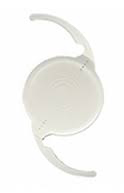Have you experienced blurry vision and vision loss? These are some of the signs of having a cataract.
Most people that have cataracts will eventually need to have cataract surgery. Having cataract surgery is the only way to restore vision lost due to having cataracts.
The good news is that vision loss because of cataracts doesn’t have to be permanent. Cataracts form because of proteins in the eye breaking down and impacting vision.
For patients with cataracts, one of the most common signs is blurry vision and the steady decline of their sight.
Most people develop cataracts due to aging, but they can also develop due to an eye injury. Cataracts typically develop very slowly over time.
Symptoms can include blurry vision, halos, glare, double vision, seeing colors as more faded, and increased sensitivity to light. Fortunately, you can treat them by having cataract surgery.
To diagnose cataracts early on, you should schedule routine eye exams with your eye doctor. If you end up having cataracts, your ophthalmologist can monitor them and recommend the best time to have surgery.
During cataract surgery, your cataract surgeon will remove the natural lens and replace it with an artificial lens known as an intraocular lens (IOL). An intraocular lens replaces the focusing power of your eye’s natural lens, enabling you to have crisp, clear vision.
Depending on the lens implant you choose, you might even end up with the best vision you’ve ever had. The IOL is permanent and doesn’t require maintenance. Keep reading to learn more about cataract surgery and how it can change your life!
How Does Cataract Surgery Work?
Because cataracts are proteins that develop and form in the natural lens of the eye, you can’t separate them from the lens. For this reason, the cataract surgeon will remove your natural lens and replace it with an IOL.

Cataract surgery is usually performed as an outpatient procedure, so you’ll be able to go home after it’s over. If you have cataracts in both eyes, you’ll first have the procedure performed on the eye that has been affected the most.
After you’ve healed and can see, you’ll have cataract surgery on your second eye. If you have cataract surgery on both eyes at the same time, it can negatively affect your ability to see.
Despite the high success rate of cataract surgery, there’s still the possibility of risks as it’s a surgical procedure. For cataract surgery, one of the biggest concerns is developing infections after the procedure.
If you have cataract surgery on both eyes simultaneously, it could lead to an infection in both eyes.
Types of Cataract Surgery
There are different ways of removing cataracts. At Evergreen Eye Center, we offer our cataract patients the following options:
Comfortec Cataract Surgery
This advanced technique in cataract removal eliminates needle sticks, sutures, and the use of an IV. As a result, the procedure is less stressful and more comfortable for patients.

It also has fewer risks of complications for a surgery already known for its very high success rate. The incision created in this method is small enough that no stitches are needed.
Dropless Cataract Surgery
During traditional methods of cataract surgery, patients have to use weeks of eye drop regimens to minimize the chances of infection and promote faster healing.
Although eye drops work well, they’re expensive. Additionally, the anti-inflammatory and antibiotic drops must be strictly administered at specific intervals, several times a day, to reduce inflammation and prevent infection.
Dropless cataract surgery is an option offered to patients of Evergreen Eye Center at no additional cost. With this advanced technique, your cataract surgeon applies a combination of anti-inflammatory and antibiotic medication to your eye during the procedure.
The medications are then slowly absorbed by your eye over the next month as you recover, preventing infection and swelling. Most patients that have dropless cataract surgery don’t need to use eye drops during their recovery.
Dropless cataract surgery considerably reduces out-of-pocket costs as you won’t need eye drops. It also simplifies care after cataract surgery since you won’t have to worry about if you’re putting the drops in your eyes properly.
IOL Options

There are many different types of IOLs, giving you the option to customize your vision depending on your preferences, visual goals, and lifestyle. Your ophthalmologist can help you choose the best IOL before you have cataract surgery.
At Evergreen Eye Center, we offer our patients the following IOL choices:
Monofocal IOL
Monofocal IOLs provide patients with sharp vision at one distance. To see clearly at other distances, you’ll need to wear glasses. Monofocal IOLs are an excellent option if you don’t mind needing visual aids after cataract surgery. They are the only IOL that insurance will cover, making them the most affordable.
Multifocal IOL
The technological innovation of a multifocal IOL allows it to deliver a complete range of clear vision, including things that are far away, in between, and up close. Choosing a multifocal IOL can decrease your dependence on contact lenses and eyeglasses.
Toric IOL
If you have astigmatism, the best choice may be a toric IOL. Toric lenses are the only ones specifically designed to correct astigmatism.
They also allow you to take advantage of the benefits of cataract surgery, giving you better vision.
Toric Multifocal IOL
For patients with higher levels of astigmatism and presbyopia, you can correct these visual problems while also delivering a full range of vision. This level of vision correction was not available to these patients with standard multifocal lenses.
What is the Recovery Process After Cataract Surgery Like?
Although the recovery process after cataract surgery is necessary, it’s short and easy to come back from. Any discomfort and soreness often disappear within several days.

Your vision will seem a lot clearer after you’ve had cataract surgery. This is because a new artificial lens has replaced the clouded lens.
However, you won’t attain your best vision for some time. Complete recovery can take anywhere between 4 to 6 weeks.
It’s vital to follow all post-operative care instructions from your surgeon, including attending all follow-up appointments, to ensure a smooth recovery.
Best Cataract Treatment
Cataracts can compromise your vision, but you can treat them by having cataract surgery to remove them. The ophthalmologists at Evergreen Eye Center offer the most effective cataract removal techniques available.
Before your procedure, you’ll meet with the team at Evergreen Eye Center to determine the ideal method based on your unique needs.
Are you wondering whether it’s the right time to have cataract surgery? Schedule a cataract consultation at Evergreen Eye Center in Auburn, WA, today to learn more!

